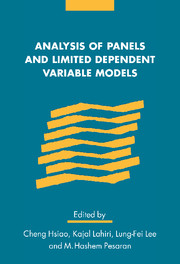Book contents
- Frontmatter
- Contents
- List of contributors
- Foreword
- Introduction
- 1 A note on left censoring
- 2 Autoregressive models with sample selectivity for panel data
- 3 Mixture of normals probit models
- 4 Estimation of dynamic limited-dependent rational expectations models
- 5 A Monte Carlo study of EC estimation in panel data models with limited dependent variables and heterogeneity
- 6 Properties of alternative estimators of dynamic panel models: an empirical analysis of cross-country data for the study of economic growth
- 7 Modified generalized instrumental variables estimation of panel data models with strictly exogenous instrumental variables
- 8 Expectations of expansions for estimators in a dynamic panel data model: some results for weakly exogenous regressors
- 9 Re-examining the rational expectations hypothesis using panel data on multi-period forecasts
- 10 Prediction from the regression model with one-way error components
- 11 Bayes estimation of short-run coefficients in dynamic panel data models
- 12 Bias reduction in estimating long-run relationships from dynamic heterogeneous panels
- CV of G.S. Maddala
- Index
1 - A note on left censoring
Published online by Cambridge University Press: 22 September 2009
- Frontmatter
- Contents
- List of contributors
- Foreword
- Introduction
- 1 A note on left censoring
- 2 Autoregressive models with sample selectivity for panel data
- 3 Mixture of normals probit models
- 4 Estimation of dynamic limited-dependent rational expectations models
- 5 A Monte Carlo study of EC estimation in panel data models with limited dependent variables and heterogeneity
- 6 Properties of alternative estimators of dynamic panel models: an empirical analysis of cross-country data for the study of economic growth
- 7 Modified generalized instrumental variables estimation of panel data models with strictly exogenous instrumental variables
- 8 Expectations of expansions for estimators in a dynamic panel data model: some results for weakly exogenous regressors
- 9 Re-examining the rational expectations hypothesis using panel data on multi-period forecasts
- 10 Prediction from the regression model with one-way error components
- 11 Bayes estimation of short-run coefficients in dynamic panel data models
- 12 Bias reduction in estimating long-run relationships from dynamic heterogeneous panels
- CV of G.S. Maddala
- Index
Summary
Introduction
Left censoring occurs in a duration model when a statistician observes only those spells which either are in the middle of continuation at the time of the first observation or start during the observation period. It is assumed that the statistician has no record of those spells which had ended by the time of the first observation. A special treatment of the problem is necessary because ignoring left censoring will overestimate the mean duration as longer spells tend to be observed more frequently than shorter spells. This is called selectivity bias.
Different cases of left censoring arise depending on the following considerations: (1) Spells in the middle of continuation at the time of the first observation are either completely or partially observed. Suppose such a spell started at s, continued on to 0 (the time of the first observation), and ended at t. The statistician may observe only s (by asking how long the spell had lasted), only t, or both. (2) Spells which start after the time of the first observation are either observed or not observed. (3) For a single individual we either observe a single spell or a sequence of spells in different states.
In each possible case we will consider how the selectivity bias is eliminated. If the model is fully specified, this is accomplished by the method of maximum likelihood estimation, which is fully efficient.
- Type
- Chapter
- Information
- Publisher: Cambridge University PressPrint publication year: 1999
- 8
- Cited by



